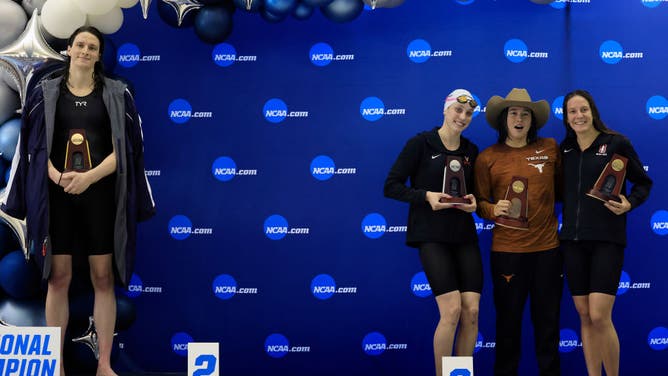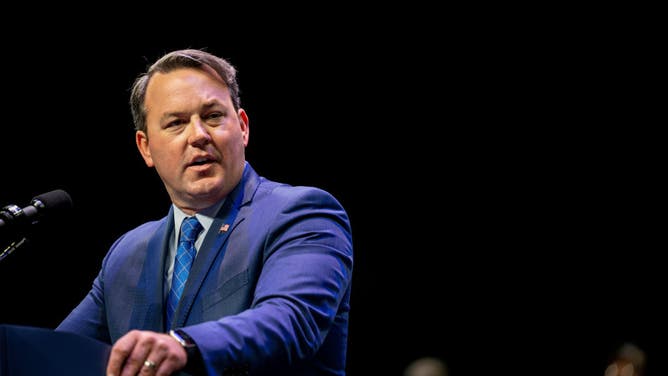Georgia Board Of Regents Asks NCAA To Ban Transgender Athletes From Women's Sports
The Georgia Board of Regents voted on Tuesday to ask the NCAA and the National Junior College Athletic Association (NJCAA) to ban transgender athletes from women's collegiate sports.
The unanimous vote came after Georgia Lt. Gov. Burt Jones vowed in August to pass legislation that would prevent trans-identifying males from participating in athletic events at public colleges.
The 19-member Board of Regents oversees all public colleges and universities in the state, 25 of which have sports programs. Four are members of the NJCAA, five are members of the National Association of Intercollegiate Athletics (NAIA), and the remaining 16 are NCAA members.
Each of the governing bodies has the authority to adopt its own policies on transgender participation.

There are 16 NCAA member schools in Georgia, including the University of Georgia and Georgia Tech.
(Photo by Aaron M. Sprecher/Getty Images)
In April, the NAIA voted to ban transgender athletes from competing in women’s sports at its 241 mostly small colleges. Per NAIA policy, all eligible student-athletes may compete in men's sports, but only biological females who have not undergone hormone therapy may compete in the women's division.
READ: NAIA Bans Transgender Athletes From Women's Sports With Unanimous Vote
The NCAA, on the other hand, follows the standards of the international governing bodies for each individual sport. Before August 2024, NCAA policy called for one year of testosterone suppression treatment and documented testosterone levels submitted before championship competitions.
The NJCAA allows transgender student-athletes to participate in female sports "in some circumstances."
"Those are three very different sets of rules that our institutions’ athletic programs are governed by at this point," Board of Regents Secretary Chris McGraw said.
So the Board of Regents is asking for some consistency — and fairness.
Georgia Board Of Regents Asks All Organizations To Adopt NAIA Policy
Transgender athletes’ participation in women’s sports was a hot topic in Georgia’s General Assembly in 2022 as lawmakers debated and eventually passed a law permitting the Georgia High School Association to regulate male participation in girls' sports.
That came after the 2022 NCAA Swimming and Diving Championships in Atlanta, where male swimmer Lia Thomas won the women's 500-meter freestyle and became the first transgender athlete to win an NCAA Division I title.

Male swimmer Lia Thomas sparked major controversy after winning an NCAA Division I title in 2022.
(Photo by Justin Casterline/Getty Images)
Following Thomas' championship, World Aquatics — swimming's international governing body — banned all athletes who have undergone male puberty from participating in women's events. Thus, the NCAA now has the same policy for swimming and diving.
But the Board of Regents wants to ensure fairness and safety for women in all collegiate sports. And that's why they're asking the NCAA and NJCAA to adopt the NAIA's rules, which would outright ban biological males from female events.
RELATED: Teammate Of SJSU Transgender Volleyball Player Blaire Fleming Joins Lawsuit Against NCAA
Of course, not everyone sees this as a positive solution.
Jeff Graham, the executive director of LGBTQ+ rights group Georgia Equality, said the university system "should recognize the importance of diversity at many levels and should be there to care about the educational experience of all of their students regardless of their gender or gender identity."
"I’m certainly disappointed to see the Board of Regents of the University System of Georgia is spending its time passing resolutions that only serve to stigmatize transgender students and perpetuate misinformation about the reality of what is happening within athletic competitions involving transgender athletes," Graham told the Associated Press.

Georgia Lt. Gov. Burt Jones.
(Photo by Brandon Bell/Getty Images)
Lt. Gov. Jones, though, thanked the regents for their vote.
"The work female athletes put into competing should be protected at all cost, no matter the age," Jones wrote in a post on X. "This action brings us one step closer toward achieving that ultimate goal."
The NCAA is already under immense pressure to amend its transgender policy as 19 current and former female athletes — including OutKick's Riley Gaines — are currently suing the NCAA over Title IX violations.